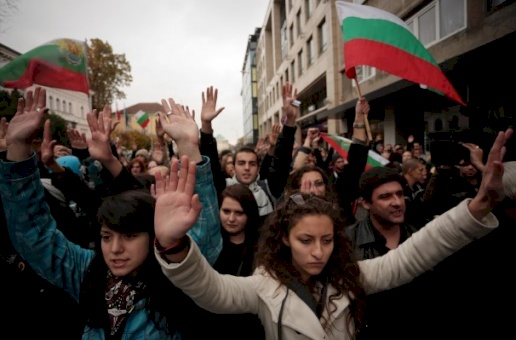
By Associated Press, Published: November 17
SOFIA, Bulgaria — Ivaylo Dinev believes the time has come to change his world. To do so, he’s chosen a tactic straight from the 1960s — the sit-in.
The 24-year-old anthropology student is the informal leader of a group that has occupied Sofia University’s main building since the end of October in hopes of forcing Bulgaria’s Socialist-led government to resign.
“We want morality in politics, we want our politicians to work for the people and not for the Mafia,” Dinev said. “That is the main reason we want the government to resign.”
Bulgaria has struggled for decades against corruption. In the 28-nation EU, it lags only behind Greece on Transparency International’s corruption perception index. In the country’s courts, magistrates have accepted bribes to end some corruption investigations and not a single high-profile person has been sent to jail.
The century-old occupied building is in the very center of Sofia, the capital, just 200 meters (yards) from Parliament. Behind entrances locked with iron chains and makeshift security checkpoints, a few hundred young men and women have barricaded themselves in what they call the “free territory of the students.”
Under a huge symbolic sign “1968” — the year that Czech students challenged their country’s powerful former Communist regime — a banner reads: “Now it is our time.”
“As a growing parallel power, we are sending from our free territory critical messages to all political parties about the future of the country,” Dinev told The Associated Press in an interview.
The Sofia University occupation has spawned other university sit-ins, energizing a 5-month-old movement against the government over allegations that its leaders have ties to shady businessmen. Public opinion polls show about two-thirds of Bulgaria’s 7.3 million people support the protesters, including several hundred university professors.
Bulgaria is a member of the 28-nation European Union but its people have the bloc’s lowest incomes — an average monthly wage of just 400 euros ($537) and an average pension of just 150 euros ($202). Youth unemployment is at 28.7 percent. Growing economic pains and widespread poverty have created deep divisions in society.
The 50 students who first occupied Sofia University say they will stay until the government steps down, Dinev said, adding that their numbers have swelled to 500.
The mood inside the century-old building was upbeat. Slogans reading “Resignation” and “Mafia” were up on inner courtyard walls. Sleeping bags were draped on benches in the corridors as makeshift beds.
Some students carried bags of food partly donated by supporters, while in a coffee shop, small groups were debating the future they want to build. No classes are being taught in the building — home to the law, philosophy and language departments — but at a daily conference in the main hall, students meet to outline future actions.
As his phone rings, Dinev says the students have rejected several invitations to collaborate with Bulgaria’s established political parties.
